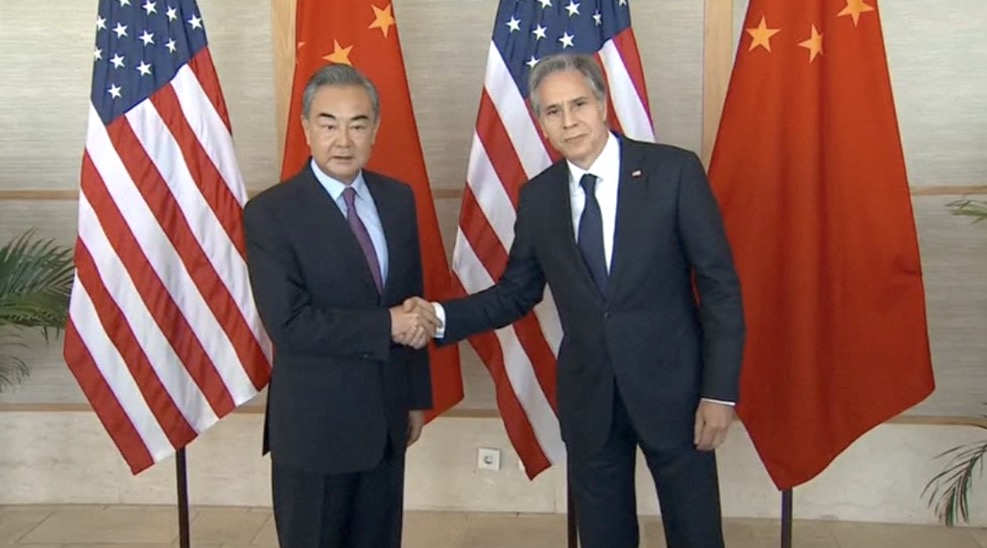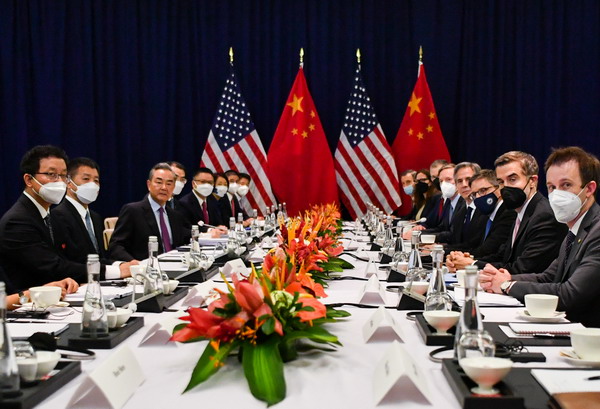00:32

Chinese State Councilor and Foreign Minister Wang Yi and U.S. Secretary of State Antony Blinken had "substantive and constructive" talks on China-U.S. relations and major international and regional issues of common concern on Saturday, according to China's Foreign Ministry.
The two met on the sidelines of the G20 Foreign Ministers' Meeting in Bali, Indonesia.
The "thorough, in-depth, candid and long" communication helped enhance mutual understanding and reduce misunderstandings and misjudgments between the two sides, and pave the way for future high-level exchanges between the two countries.
At present, China-U.S. relations are still in a predicament created by the previous U.S. administration and are even encountering more and more challenges, Wang said.
The foreign minister said the fundamental reason was the U.S. perception of China, and that its corresponding China policy had deviated from the right track.

Chinese State Councilor and Foreign Minister Wang Yi (3rd L) meets with U.S. Secretary of State Antony Blinken (4th R) a day after the Group of 20 (G20) foreign ministers' meeting in Bali, Indonesia, July 9, 2022. /Chinese Foreign Ministry
Chinese State Councilor and Foreign Minister Wang Yi (3rd L) meets with U.S. Secretary of State Antony Blinken (4th R) a day after the Group of 20 (G20) foreign ministers' meeting in Bali, Indonesia, July 9, 2022. /Chinese Foreign Ministry
Saying the key to lifting bilateral relations out of the mire is to implement the consensus reached by the two heads of state, Wang stressed that China has practiced mutual respect, peaceful coexistence and win-win cooperation as three principles in developing China-U.S. relations.
Since the U.S. has pledged not to seek to change China's system, it should respect the path of socialism with Chinese characteristics chosen by the Chinese people, the foreign minister said.
Since the U.S. has pledged not seek to have a new cold war with China, it should abandon the cold war mentality and the zero-sum game mindset, he added.
Since the U.S. has promised not to support "Taiwan independence," it should stop distorting the one-China policy, he said.
The Chinese foreign minister highlighted that the "guardrails" of China-U.S. relations are the three China-U.S. joint communiques.
China has also put forward four lists to the United States: the list of U.S. wrongdoings that must stop, the list of key individual cases that China has concerns with, the list of China-related bills of major concern to China, and the list of eight areas of China-U.S. cooperation.
Blinken outlined the U.S. policy towards China, saying that the country does not seek a new cold war with China, does not aim to change China's system, does not challenge the ruling status of the Communist Party of China, does not contain China and does not support "Taiwan independence."
The foreign ministers reached consensus on pushing for more outcomes from the consultations of the China-U.S. joint working group on an equal and reciprocal basis, and agreed to resume people-to-people exchanges and consultations, and strengthen cooperation on climate change and public health.
The two sides also put forward the vision of sound interaction between China and the U.S. in the Asia-Pacific region, and exchanged in-depth views on the Ukrainian issue and the situation on the Korean Peninsula.
(Cover: Chinese State Councilor and Foreign Minister Wang Yi (L) meets with U.S. Secretary of State Antony Blinken a day after the Group of 20 (G20) foreign ministers' meeting in Bali, Indonesia, July 9, 2022. /Chinese Foreign Ministry)

